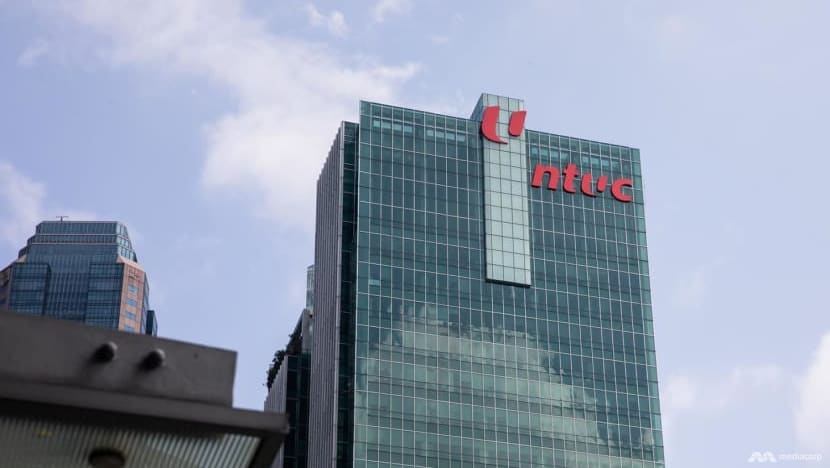NTUC designated 'politically significant person' under Singapore's foreign interference law
The labour movement will be required to make annual disclosures on political donations of S$10,000 (US$7,400) or more, as well as its foreign affiliations.

The exterior of NTUC Centre on Jul 11, 2024. (Photo: TODAY/Ili Nadhirah Mansor)

This audio is generated by an AI tool.
SINGAPORE: The National Trades Union Congress (NTUC) on Friday (Jul 26) became the third organisation to be designated a “politically significant person” (PSP) under Singapore’s foreign interference law.
It had been given 14 days - after being first officially informed of the government's intention to make it a PSP - to submit representations to the Registrar of Foreign and Political Disclosures, who is appointed by the Home Affairs Minister.
On Friday, the Ministry of Home Affairs (MHA) said NTUC had not submitted any representations.
The Registrar “remains of the view that NTUC should be designated as a PSP”, said MHA.
“Similar to other designated PSPs, NTUC has a right to appeal to the Minister for Home Affairs against the Registrar’s decision.”
As a designated PSP, the labour movement will be required to make annual disclosures on political donations of S$10,000 (US$7,400) or more, as well as its foreign affiliations.
“These transparency requirements will mitigate NTUC’s risk of being a target of foreign interference,” MHA said.
In a statement on Friday, NTUC said it was informed of MHA's decision to officially designate NTUC as a PSP under the Foreign Interference (Countermeasures) Act (FICA).
NTUC acknowledges being designated as a PSP without objection, and notes that MHA is doing so as a "pre-emptive measure" to mitigate foreign interference, said its secretary-general Ng Chee Meng.
"We support safeguarding Singapore's sovereignty and will adhere to the requirements under FICA."
"NTUC will continue championing workers' interests for better wages, welfare and work prospects. We assure the public and our partners that our operations and services will continue unabated," Mr Ng added.
CLOSE, SYMBIOTIC PAP LINKS
On Jul 11, NTUC was informed of the government's intention to designate it as a PSP due to its “close nexus and symbiotic relationship” with the ruling People’s Action Party (PAP).
MHA had also then described NTUC’s designation as a “pre-emptive measure”.
“It is not because NTUC has been compromised by a foreign actor, or has committed any wrongdoing nor anything of concern,” the ministry said in response to media queries.
It also said that the Registrar only intends to designate NTUC at the federation level.
“The other NTUC-linked entities have much less or no nexus to Singapore politics, and there is no public interest to designate them,” it said.
NTUC’s designation will, therefore, not cover its affiliated unions, affiliated associations or social enterprises, which are separate legal entities.
“NTUC’s designation will also not include NTUC’s personnel such as its Central Committee members and employees,” MHA added, noting, however, that some of NTUC’s Central Committee members and appointment holders may already be PSPs by virtue of their roles outside NTUC.
NTUC said then that it does not accept donations from political entities.
"The National Trades Union Congress is aligned with national safeguards to prevent foreign interference, and we will continue to ensure that our operations remain free from foreign influence," a spokesperson told CNA.
Listen:
THIRD ORGANISATION TO BE DESIGNATED PSP
Singapore's foreign interference law is aimed at strengthening the government’s ability to prevent, detect and disrupt foreign interference in domestic politics. The Bill was passed in parliament in October 2021 after a lengthy debate.
Political parties, political office holders, Members of Parliament, election candidates and their agents are among those defined as PSPs.
NTUC is the third organisation to be designated a PSP, following human rights groups Maruah and Think Centre.
Maruah and Think Centre were designated as PSPs in December 2023 and are therefore subject to stricter measures on political donations.
Maruah aims to promote human rights at the national, regional and international levels. It is also the Singapore focal point for the Working Group for an ASEAN Human Rights Mechanism, an NGO recognised in the ASEAN Charter.
Think Centre is a member of Forum Asia, an international NGO working on human rights.
In February, Singaporean businessman Philip Chan Man Ping became the first person to be designated as a PSP under the foreign interference law.
MHA said at the time that Mr Chan, who immigrated from Hong Kong in 1990, showed “susceptibility to be influenced by foreign actors, and willingness to advance their interests”. The foreign actors involved were not identified.
Law and Home Affairs Minister K Shanmugam previously said that when the Singapore authorities decide to designate someone a PSP under the foreign interference law, they must conclude that it is in the public interest to do so.
In response to parliamentary questions, Mr Shanmugam explained on Feb 29 that to be designated as a PSP, an individual must be a member of a foreign legislature or foreign political organisation, or their activities must be directed towards a political end in Singapore.
“But in addition to this, there is also the public interest criteria that must be satisfied,” he added.


















